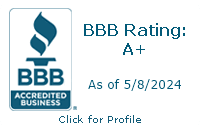Make your life easier! Say "Good-bye" to your over-dependence on spreadsheets!

We've all done it – kept seeing someone we knew was not right for a long-term relationship, yet was still "good enough" for the short-term. "I admit it – I'll never end up taking my relationship with Ann to the next level, yet she's fun to be around and someone to do things with." If you think about seeing who else might be on the market, you know doing so takes time and effort – and you know you will end up feeling at least a wee bit guilty if you do. Still, there will come a time to break up with Ann, yet ... not right now.
I've seen people have the same sort of relationship with the software they use. It starts out innocently enough –"QuickBooks doesn't provide such-and-such capability, but if I export sales data from it, and import it into Excel, I can massage the data to get the figures I need." You bring the analysis into a meeting, and people are impressed! In fact, your boss wants you to produce it each week for the Monday morning staff meeting – and meet this week with Betty and Charlie to help them prepare better analyses for next week's monthly management meeting.
You're in deep with Excel now – you ask your boss for some training on its advanced features, and she approves the class. It's a great class, and you learn all about using advanced functions, scripting in VBA for Excel, fetching data from external sources, and more. Back at work, you apply your newfound Excel knowledge and even use it to connect to a Microsoft Access database maintained by Dave in Payroll.
Meanwhile, the business is growing AND getting more complex, so you end up running a larger and more complicated company on shrinkwrap software totaling less than $1,000. You know this is not sustainable, yet it's "good enough" for now. Oh, and Microsoft is going to have some REALLY useful features in the next version of Excel!
So the business' computing infrastructure is "good enough" ... until it's not.
- Until the QuickBooks database gets so large it requires repairs every 3 or 4 days.
- Until someone quotes a big new customer using an old price list on the share drive, and you can't back out of the contract.
- Until the ten nearly identical Access databases you have for each of your ten branch locations – which all began life from the same source – need to updating to add some new capabilities, and you're stuck making ten slightly different sets of changes.
- Until you take stock and find running your business depends on 100+ Excel worksheets and Word documents to supplement QuickBooks.
- Until you want to use barcodes and scanners to help you better keep track of huge bundles of second and third quality products, stacked to the ceiling of three warehouses totaling about two acres of floor space, and you learn Sage 50 (formerly, Peachtree Accounting) won't accommodate that.
- Until your biggest customer wants you to produce a daily status report on projects they've sent to you via Excel – and, of course, the four persons sending you these have each created their own Excel sheet to launch and manage the projects.
People use the tools they've been provided, and these are frequently the "bloatware" products commonly known as Microsoft Office. Of all the Office applications, I only love one – Excel. (Of course, I hate the ribbon interface on Excel and all its siblings.) It is the Office product which has stayed closest to its rows-and-columns roots, and which typically correctly guesses what you want to achieve and actually HELPS you. (Don't get me started on Word ... )
The problem with Office is that Microsoft has added or enhanced the features of all the products over the years, to entice users to upgrade. The upgrades also typically improve performance, so the combination of better features and performance pushes "good enough" out another one to two years. Intuit is just as guilty, pushing "good enough" for QuickBooks out another two or three years.
So you end up with ...
- A spreadsheet straining to do database-like tasks ...
- A word processor stretching to perform report writer-type work (don't laugh – one ERP package I've recently worked with actually DOES use Microsoft Word to print pallet labels for outgoing shipments and similar high-volume labels, which eats away at the server's memory throughout the day because exiting Word doesn't fully release all the memory it occupied) ...
- A database appropriate for one or two users running cost sheet calculations for a nearly billion dollar division of a large company, and corrupting frequently ...
- An entry-level accounting solution appropriate for a startup stage now groaning to serve the needs of a larger and more sophisticated company ...
- And users thinking there MUST be better tools and processes than these to run the business.
Any of these situations seem familiar? If so,"good enough" no longer is. Todd Herman Associates can likely help you. Give me a call or shoot me an email – I am happy to talk with you, understand your pains, and suggest some options for you to consider. I can't help you break up with Ann or Andy, yet I can help you break up with software which is no longer working for you.
Sincerely,

Todd L. Herman
PS – I'm not making any of this up! All the examples I described are real-life situations I've seen at prospects or clients over the last 18 months.






